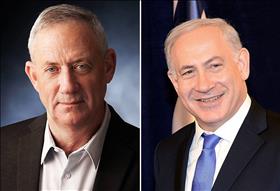The battle is heating up
Religion and state under Netanyahu's new government
This week, the Supreme Court unanimously rejected all of the petitions against Benjamin Netanyahu's continued tenure as prime minister due to the pending criminal charges against him, as well as those against the coalition agreement between the Likud and Blue & White.
07/05/2020 19:19
Tags: Benjamin Netanyahu · David Ben Gurion · Religion and state · coalition

Benny Gantz (left) and Bibi Netanyahu (right), source: Wikipedia
The Supreme Court's ruling paved the way for the implementation of the coalition agreement and the establishment of the new government, which, in addition to Likud and Blue & White, will include other partners, such as the ultra-Orthodox parties.
As we’ve written, the agreement itself does not address the status quo on religious issues. Nevertheless, it will surely be nearly impossible for Blue & White and the Labor Party to promote the religious freedom initiatives that they had promised in their campaigns. Not only that, but there will also be heavy pressure from the ultra-Orthodox parties to "close holes" that may come to the fore in the coming months, especially because of pending petitions before the Supreme Court, which address issues such as ‘who is a Jew’, the Western Wall, the enlistment of yeshiva students into the IDF, and more.
The court's ruling last week on the ban against searching the bags of hospital visitors for leavened food products during Passover and preventing its entry into the hospital is but one example, which, as expected, already caused a flood of attacks and threats against the Supreme Court by the religious parties.
This ensures that the coming months and years will set the scene for the ongoing battle over religion and state, which will see an ongoing effort by the religious parties to violate the independence and authority of the Supreme Court. This will have far-reaching implications for Israel's population, but also for the Jewish state’s relationship with Diaspora Jewry, particularly the large Jewish community of North America.
May the commitment to pluralism and more reciprocal relations between Israel and Diaspora Jewry guide Jewish organizations in formulating their policies in relation to Israel and their decisions on allocating resources to programs in Israel.
We bring you an important interview recently conducted by a Haredi newspaper with the head of the Jewish Federation of New York. His answers deserve the utmost praise, and we hope that Jewish leadership outside of New York will also work in this spirit. May the commitment to pluralism and more reciprocal relations between Israel and Diaspora Jewry guide Jewish organizations in formulating their policies in relation to Israel and their decisions on allocating resources to programs in Israel.
In the interview, a representative of the ultra-Orthodox newspaper talks about the status quo on religious issues and reiterates a myth about the historic meeting in 1952 between Ben Gurion and Rabbi Karlitz [Hazon Ish]. We took the opportunity to dig out the only credible description of this historic event, made by the only person who attended the meeting between Ben Gurion and the Hazon Ish. His description speaks for itself and reads as if the meeting was taking place today.
The arguments on both sides are as relevant today as they were in 1952, and it is clear that Ben-Gurion was not convinced at the time of the ultra-Orthodox rabbi’s arguments, just as most of the Israeli public today is not convinced by the same, tired arguments. This is not a theoretical argument, but rather It has far-reaching implications for the future of the State of Israel, individual liberties, human dignity, Israel-Diaspora Relations, Israel’s economy, the state’s security, the status of women, and more.
Another dimension to this debate, not well known in the Diaspora, concerns the ultra-Orthodox worldview with regard to the State of Israel. Recently marking Independence Day, Memorial Day and Holocaust Memorial Day provides us with an opportunity to share important insights on this matter as well.
All of this reaffirms the importance of Hiddush’s work and that of its partners; and we would love to hear from you about how you see this battle for Israel playing out.